- Home
- Tim LaHaye
Luke's Story: By Faith Alone Page 8
Luke's Story: By Faith Alone Read online
Page 8
Besides his own personal intrigue, the historian in Luke also loved this story and wished he were writing it down. “And he gave you this authority?”
“He did. He praised me again, provided the documents, told me he was proud of me, and wished me Godspeed. I confess, Luke, I was as proud of myself as I could be. Not only had this been my idea, but I had also clearly already impressed the high priest, and I just knew that if I succeeded on this mission, my future as a Jewish leader in Jerusalem would be guaranteed.”
“So you were doing this as much for yourself as for God?”
“Oh, certainly! I didn’t see it then, of course, but it’s quite clear to me now. Then I truly believed God would be pleased with me as well. And there is no better feeling.”
“For one who believes in these sorts of things, I suppose.” What had been so ingrained in Luke that he found it so difficult to think unconventionally? Dare he believe in something beyond himself, as so many of his patients now did? As Paul clearly always had? As Saul, his old acquaintance had seemed miserable. But Luke’s believing patients exhibited an inner peace he could not understand. And now Paul seemed so different.
Paul rubbed a sleeve across his mouth and grinned. “So said by one to whom God Himself would have to speak, or before whom some miracle would have to be performed in order for him to believe.”
“I’m afraid so,” Luke said. “I’ve seen too many misguided people put their trust in the immaterial and wind up none the better for it.” He was div> “Luke, I had no choice. Jesus was speaking to me from heaven, and I knew He could have killed me on the spot.”
“And what did he tell you to do?”
“He said, ‘Arise and go into the city, and you will be told what you must do.’”
“What did your traveling companions make of all this?”
“They stood speechless, telling me later that they had heard a voice but saw no one. When I arose I opened my eyes and could see nothing. My men led me by the hand and brought me into Damascus to the house of a man named Judas on a street called Straight. For three days I could see nothing, and I had lost my appetite. I neither ate nor drank all that time. I simply prayed the entire time. And during my prayer, the Lord gave me a vision. In my mind’s eye I saw a man named Ananias coming to lay his hand on me that I might receive my sight.
“Now soon, Luke, as God is my witness, a man arrived and introduced himself as Ananias. He said, ‘The Lord spoke to me in a vision, and told me to arise and go to the street called Straight and inquire at the house of Judas for one called Saul of Tarsus, for behold, he is praying and in a vision has seen a man named Ananias coming in and putting his hand on him, so that he might receive his sight.’
“Ananias told me that he told the Lord he had heard from many about me and how much harm I had done to the saints in Jerusalem. He had even heard I had authority from the chief priests to bind all who call on Jesus’ name. But still the Lord told him to go and said to him, ‘for he is a chosen vessel of Mine to bear My name before Gentiles, kings, and the children of Israel. For I will show him how many things he must suffer for My name’s sake.’”
Luke found himself actually envying Paul’s passion, though this was all too much to fathom. “Gentiles, kings, and your own people? Did that make any sense to you?”
“Luke, really, what makes sense to a man in my condition? I can tell you I had no doubt God was working in me somehow. That was all I knew. Ananias laid his hands on me and said, ‘Brother Saul, the Lord Jesus, who appeared to you on the road as you came, has sent me that you may receive your sight and be filled with the Holy Spirit.’”
“What did that mean?”
“Well, I didn’t know either until immediately there fell from my eyes something like scales, and I received my sight at once. I arose and was baptized. When I had eaten, I felt strengthened. Then I spent several days with the disciples of Jesus at Damascus.”
“And all of a sudden you had gone from being their enemy to being one of them?”
“Immediately. And God gave me utterance. I preached in the synagogues that Jesus is the Christ, the Son of God. All who heard were amazed, and said, ‘Is this not he who destroyed those who called on this name in Jerusalem, and has come here for that purpose, so that he might bring them bound to the chief priests?’
“But I inc="1em">“Proving it how?”
“From the Scriptures, which I knew almost by heart. And by performing miracles.”
“You? You performed miracles?”
Paul nodded.
“Show me.”
“Show you? The miracles that Jesus and His disciples performed are not for entertainment, Luke. They are done to show the power of God unto sal
vation. When men see them, they believe and come to repentance.”
“Repentance?”
“Of sin. I have come to believe that Jesus is who He claimed to be, the holy and righteous Son of God who came to seek and to save those who are lost. He bore their sins in His own body on the cross, sacrificing His blood and His life for the remission of sin.”
Sin. The concept sounded so earthy, so crass, and yet it resonated with Luke. Sinful was how he felt about his pride, jealousy, conceit, lust, boastfulness. Sin was what his master Theophilus and he rued when they talked about trying to take control of their own passions and how wanting Stoicism was in this regard. They had never called it sin, of course, preferring other terms. Was it possible he could be forgiven, repent, and not be controlled by his own desires?
EIGHTEEN
I’m intrigued by how your own people responded to this change in you, Paul. You had been making a name for yourself. Your defection must have been noisy.”
“Oh, it was! In fact, after many days I became aware that the Jews were plotting to kill me. I naturally wanted to return to Jerusalem, though I feared I faced the same fate there. My hope was to persuade the disciples of Jesus that my conversion was real and to see if I could come alongside and help them in any way. But I dared not travel back out of Damascus the way I had come, for word was that the Jews were watching the gates day and night, and they would not be merely arresting or imprisoning me. The disciples of Damascus took me by night and let me down through the wall in a large basket, far from any gate, and I was able to steal away.”
“So you got to Jerusalem?”
“In truth for several years I lived in seclusion, studying, praying, and preparing myself for ministry. Partly I felt I needed to wean myself from my old ways and prepare myself for the new. But I confess that it was too dangerous for me to return to Jerusalem, once the leaders of the synagogue there had heard what had become of me. And I knew the disciples of Jesus would be wary of me also.
“It was seven years after the resurrection of Jesus that I finally stole into Jerusalem. But my hopes were almost immediately dashed. I put out the word quietly that I wished to talk with the leaders of Jesus’ disciples. I had heard they were camped in an upper room at a private home, but messages came back to me that they had no reason to believe I was being sincere. So many of their number had suffered at my hands that they naturally feared this was a trick to infiltrate them.
“My only ight="6" width="1em">“But what things were gain to me, these I have counted loss for Christ. Yet indeed I also count all things loss for the excellence of the knowledge of Christ Jesus my Lord, for whom I have suffered the loss of all things, and count them as rubbish, that I may gain Christ and be found in Him, not having my own righteousness, which is from the law, but that which is through faith in Christ, the righteousness which is from God by faith; that I may know Him and the power of His resurrection, and the fellowship of His sufferings, being conformed to His death, if, by any means, I may attain to the resurrection from the dead.
“Not that I have already attained it, or am already perfected; but I press on, that I may lay hold of that for which Christ Jesus has also laid hold of me. Luke, I do not count myself to have apprehended; but one thing I do, forgetting those thing
s that are behind and reaching forward to those things that are ahead, I press toward the goal for the prize of the upward call of God in Christ Jesus.
“I pleaded with those disciples to be like-minded with me, because I believe that our citizenship is in heaven, from which we also eagerly wait for the Savior, the Lord Jesus Christ, who will transform our lowly body that it may be conformed to His glorious body, according to the working by which He is able even to subdue all things to Himself.
“I implored them that they would see me as one of them, a coworker in the kingdom of God through Christ.”
“You were asking a lot,” Luke said.
“Indeed I was. Peter and James sat silent, trading glances, but soon Peter stood and reached for me, calling me his brother and embracing me, welcoming me to their work. I nearly wept with joy.”
“But despite their acceptance, was it safe for you to do your work there in Jerusalem?”
“Nothing is safe for me anymore, Luke, and probably nothing ever will be. I spoke boldly there in the name of the Lord Jesus, amazing everyone, especially the rulers and the Hellenists—the very ones the martyr Stephen had debated. I soon became their target, of course, but when the disciples found out, they took me to Caesarea and sent me back to my hometown for my own protection.”
“So you were in Tarsus. Would you believe I asked about you there once?”
“You did? What for?”
“I had sought you out in Jerusalem after you had left for Damascus, and that’s where I first heard the rumors. I couldn’t believe it of course, but your family covered for you.”
“Many watch out for me,” Paul said. “Else I would already be in heaven.”
“How did your movement reach Antioch?”
“The churches throughout all Judea, Galilee, and Samaria began walking in the fear of the Lord and in the comfort of the Holy Spirit, and so they multiplied.”
Luke smiled, hoping it didn’t appear as fake as it was. “Not likely. But continue with how the sect has spread as far as my own city.”
“This was all started by those who were scattered after the persecution that arose over the stoning of Stephen. They traveled as far as Phoenicia, Cyprus, and Antioch, preaching to no one but the Jews. But some of them were men from Cyprus and Cyrene, who, when they had come to Antioch, spoke to the Hellenists, preaching the Lord Jesus. I believe the hand of the Lord was with them, and a great number believed and turned to the Lord.
“When news of this reached the church in Jerusalem, they sent out Barnabas to go as far as Antioch. When he got there and saw how far the grace of God had spread, he was glad, and encouraged them all to continue with the Lord in great purpose of heart. When we get back, Luke, you will find him a good man, full of the Holy Spirit and of faith.”
“And by then you believe I will understand the Holy Spirit.”
“By then you will be filled with the Holy Spirit and able to heal more than you ever dreamed as a mere physician.”
“We shall see,” Luke said, longing for just such an occurrence but still battling his skepticism. “Now bring me up to today. What were you doing disembarking in Antioch?”
“That was all because of Barnabas. He came to Tarsus to seek me and bring me back, telling me the work was growing and that he needed my help. I believed this was of the Lord, and I plan to stay there as long as necessary to assemble with the believers and teach a great many people.”
“You know what you’re getting into?”
“Of course not! I take each day as it comes and trust the Lord to give me wisdom and strength.”
“Has Barnabas told you what your critics in Antioch call the believers?”
“Oh, yes. Christians. They say it derisively, but I like it. We are what we are.”
NINETEEN
Luke had been genuinely intrigued to see Saul after so many years and so many stories, but he frankly wasn’t sure now what he thought of the Paul version of the man. In many ways, this was the same fearless, intense, opinionated, and tireless character he had known at university. But hadn’t he simply traded one tall tale for another? There certainly would be no dissuading Paul from his beliefs, but nothing said Luke had to agree with him. Still, he was more than curious. This sect of the socalled resurrected miracle worker was indeed sweeping the world, and if the growing body of believers in Antioch was any indication, there seemed no stopping it.
That didn’t make it genuine or true, of course. Romans and Greeks had been worshiping mythological gods for centuriut d Luke knew better than to assume that made them any more real. But had there been verifiable miracles? And could there be some cure for the worst inner characteristics of men, whether or not Luke was yet ready to call those sins or call himself a sinner?
Either way, his curious, history-scholar side wanted to understand the entire scope of the developing movement. Regardless what became of it, history would contain some record of it, its various episodes, and any residual effects it might engender.
“I’d love to tell you more, Luke,” Paul said. “I want to persuade you that it’s true and that you—”
“Forgive me, Paul, but I need some time alone. Perhaps we can continue this in the morning.”
Paul seemed to study him. “I will be praying for you.”
“I have no doubt that you will. Pray that I’ll be able to sleep, despite all the thoughts rattling in my head.”
Paul grinned. “I’ll pray the opposite. I’ll pray God troubles your spirit until you rouse me from my own slumber for more of this truth.”
ONE LUXURY AFFORDED a ship’s physician, even a part-time one like Luke, was that he was not required to share lodging with the crew. Lodging was too kind a term for it, of course, as the dozens of men merely shared a common area below where they hung wet sandals and salty garments on nails and slept in swaying cots made of braided rope attached to the rafters.
On the occasional voyage on a lesser ship, Luke had been assigned one of these rudimentary hammocks and found sleep nearly impossible among the snoring and ill—usually from drink—men. He appreciated a bit of privacy and quiet, though his chambers were cramped and had no window. The sounds of the water and the wind and the sails and the creaking of the boards usually served to lull him to sleep, as long as his own hanging cot did not sway excessively because of high seas.
This night was relatively calm, yet still Luke found himself unable to doze. Was Paul really praying that Luke would not be able to sleep? His quarters were pitch-black and he was as comfortable as could be expected, but the way his mind raced reminded him of his childhood. Back then he had had to quietly steal into the kitchen and light a small lamp so he could read until drowsy. Was it mere fate or destiny that he had been born with such a brain? He was grateful for how it had benefited him—favor with his master, an eagerness, yea, a hunger, to read and learn. He knew he owed his very freedom to his intellect, but his own adopted Stoic philosophy fought against believing in coincidence or chance. He did agree with Stoicism’s idea that men were powerless in the face of nature, so he had to attribute his scholarly curiosity and abilities to that.
His old friend, having paid for the privilege of private quarters, surely believed that whatever Luke enjoyed in this life was a gift from God, the creator of the universe. Could it be? What made Paul’s god anything more than the mythological beings so many Romans and Greeks revered?
Paul’s story had been dramatic and fascinating. And despit believed Saul had been steered to his firm convictions by having all of this forced into his mind as a youngster. He had always seemed honest to a fault, direct, blunt, a realist. While he clearly truly believed his god was the one true god, maker of heaven and earth, the only seemingly fanciful stories he espoused were ones contained in the ancient texts of his religion.
But what of all this new stuff? Healing the sick, giving sight to the blind, raising a man and even a young girl from the dead, and even the resurrection of the miracle worker himself. A bright light from heaven, the cruci
fied Jesus speaking to Saul from the sky, visions, Saul’s own healing from blindness, his complete change, not of personality or character but of his life’s purpose.
It was all so much to take in.
After another hour of thrashing in the darkness, unable to rest, let alone sleep, Luke thought it only fair that Paul share his distress. He dressed and made his way to Paul’s quarters and lightly rapped on his door.
“Coming, Luke,” Paul said, laughter in his voice. Could he see through doors now too?
When Paul emerged, his hair mussed from sleep, Luke said, “How did you know it was me? Did God Himself tell you?”

 Glorious Appearing: The End of Days
Glorious Appearing: The End of Days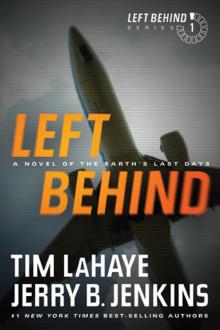 Left Behind: A Novel of the Earth's Last Days
Left Behind: A Novel of the Earth's Last Days Kingdom Come: The Final Victory
Kingdom Come: The Final Victory Nicolae: The Rise of Antichrist
Nicolae: The Rise of Antichrist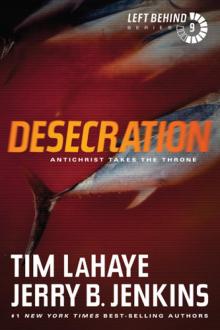 Desecration: Antichrist Takes the Throne
Desecration: Antichrist Takes the Throne Mark's Story: The Gospel According to Peter
Mark's Story: The Gospel According to Peter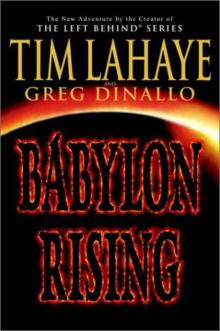 Babylon Rising
Babylon Rising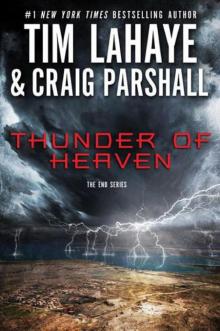 Thunder of Heaven: A Joshua Jordan Novel
Thunder of Heaven: A Joshua Jordan Novel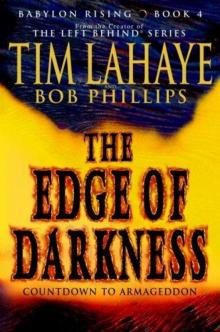 The Edge of Darkness
The Edge of Darkness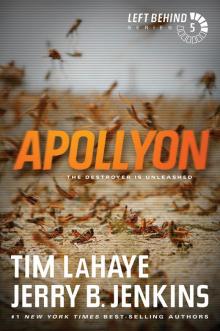 Apollyon: The Destroyer Is Unleashed
Apollyon: The Destroyer Is Unleashed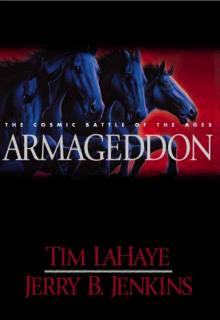 Armageddon: The Cosmic Battle of the Ages
Armageddon: The Cosmic Battle of the Ages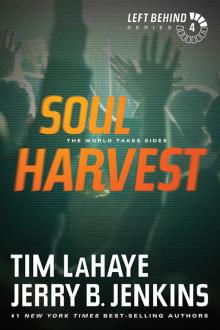 Soul Harvest: The World Takes Sides
Soul Harvest: The World Takes Sides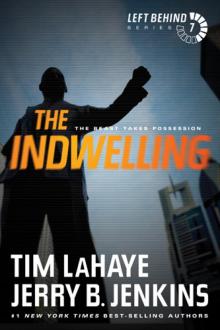 The Indwelling: The Beast Takes Possession
The Indwelling: The Beast Takes Possession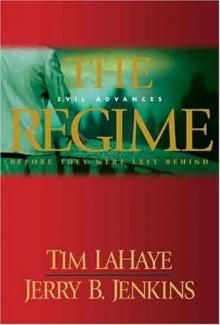 The Regime: Evil Advances
The Regime: Evil Advances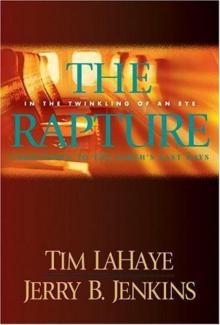 The Rapture: In the Twinkling of an Eye / Countdown to the Earth's Last Days
The Rapture: In the Twinkling of an Eye / Countdown to the Earth's Last Days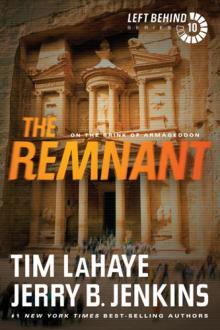 The Remnant: On the Brink of Armageddon
The Remnant: On the Brink of Armageddon John's Story: The Last Eyewitness
John's Story: The Last Eyewitness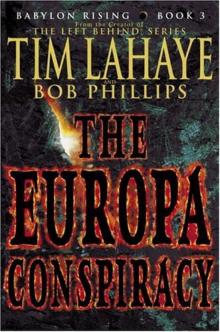 The Europa Conspiracy
The Europa Conspiracy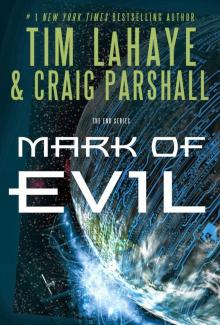 Mark of Evil
Mark of Evil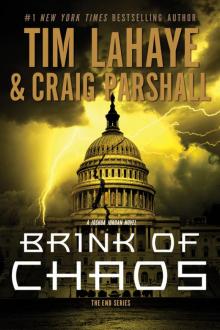 Brink of Chaos
Brink of Chaos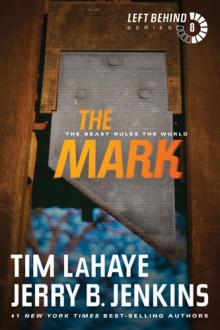 The Mark: The Beast Rules the World
The Mark: The Beast Rules the World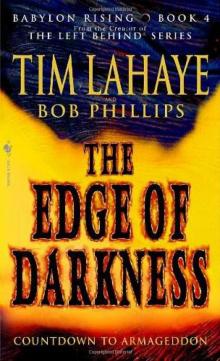 04 The Edge of Darkness
04 The Edge of Darkness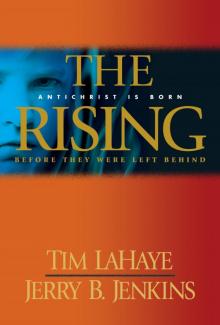 The Rising: Antichrist is Born / Before They Were Left Behind
The Rising: Antichrist is Born / Before They Were Left Behind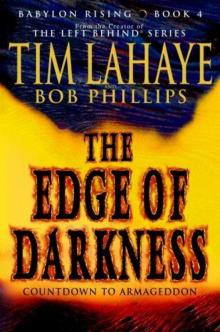 Babylon Rising: The Edge of Darkness
Babylon Rising: The Edge of Darkness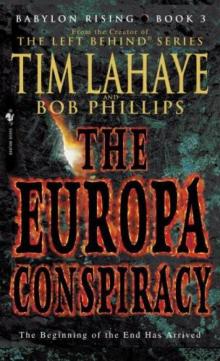 03 The Europa Conspiracy
03 The Europa Conspiracy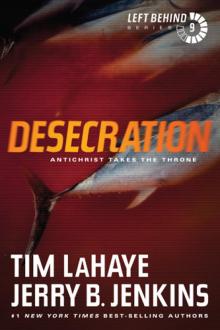 Desecration
Desecration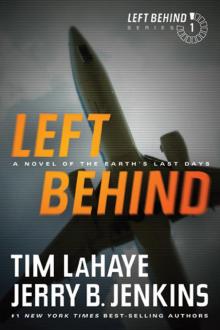 Left Behind
Left Behind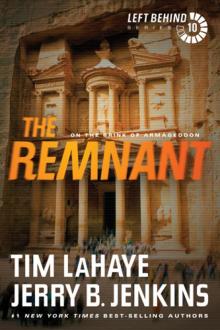 The Remnant
The Remnant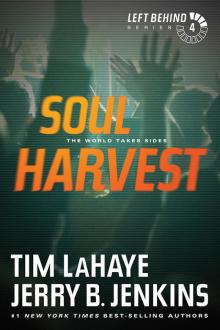 Soul Harvest
Soul Harvest Left Behind Book 13: Kingdom Come The Final Victory
Left Behind Book 13: Kingdom Come The Final Victory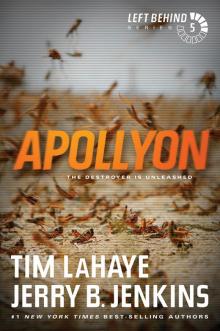 Apollyon
Apollyon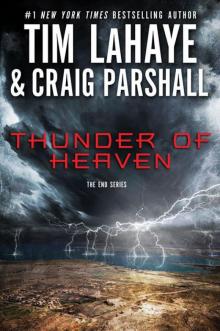 02 Thunder of Heaven: A Joshua Jordan Novel
02 Thunder of Heaven: A Joshua Jordan Novel Glorious Appearing
Glorious Appearing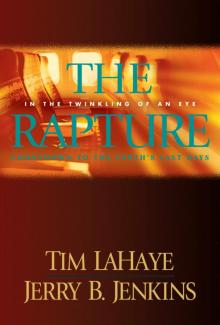 The Rapture: Evil Advances / Before They Were Left Behind
The Rapture: Evil Advances / Before They Were Left Behind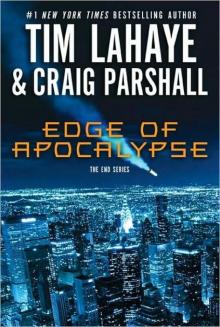 Edge of Apocalypse
Edge of Apocalypse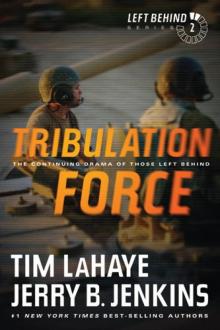 Tribulation Force
Tribulation Force The Left Behind Collection: All 12 Books
The Left Behind Collection: All 12 Books Black Friday
Black Friday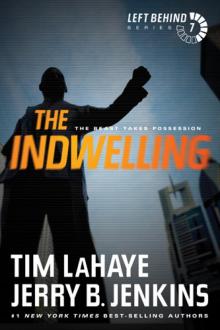 The Indwelling
The Indwelling The Left Behind Collection
The Left Behind Collection